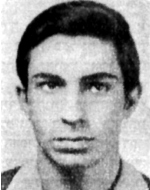Bulkin, Philip (Feivel)
Son of Betty and David, was born on February 2, 1929, in the Brooklyn district of New York City. His parents came to the United States from Lithuania. In 1935 his family moved to Los Angeles, California, where his father, a leather worker from his youth, worked in a shoe factory. Even when he was a young boy, Phillip, too, had tasted the war of survival: by the time he was nine he had helped his father balance the family budget by brushing shoes and selling newspapers. His parents tried to give him a Jewish and worker education. After classes in elementary school and later in high school, Phil studied at a Jewish school founded by the Workers’ Organization, of which his father belonged. Phil, a mischievous boy, was not interested in his studies at first. His desires were based on sport, singing (he participated in various choirs) and a tendency to play theatrical. In the higher grades of the Jewish school, the youth was very much influenced by the heroism of Jewish history. In the general school he encountered expressions of anti-Semitism. He slapped the face of one of his teachers, who called him “dirty Jew.” In 1946 he joined the US Army and served for more than a year in the garrison in Korea. Phil had never had too much militarism, and American military service had reinforced his anti-militaristic views further; However, when the news of the Jewish people’s struggle for independence came to the United States, he immediately felt that his place was with the fighters. He was convinced that the fate of the Jews in the United States would not ultimately be different from that of European Jewry. “It is possible that the extermination will be carried out in America by more sophisticated mechanical means, and will be more terrible,” argued Phil in an argument with his friends. He decided to follow his older brother Jerry and volunteer for the Israel Defense Forces. He kept this decision secret, and only on the eve of his departure in October 1948 did he reveal it to his parents. Under an assumed name, he traveled to France and from there immigrated to Israel. Upon his arrival in Israel, he joined the IDF and was assigned to a commando unit in the Armored Corps, where he participated in Operation Horev to expel the invading Egyptian army from the Negev and fell on the attack on Auja al-Hafir (Nitzana) on December 27, 1948), and was buried in Halutza On the 20th of Av 5749 (20.7.1949) he was put to rest at the Nachlat Yitzhak military cemetery.
